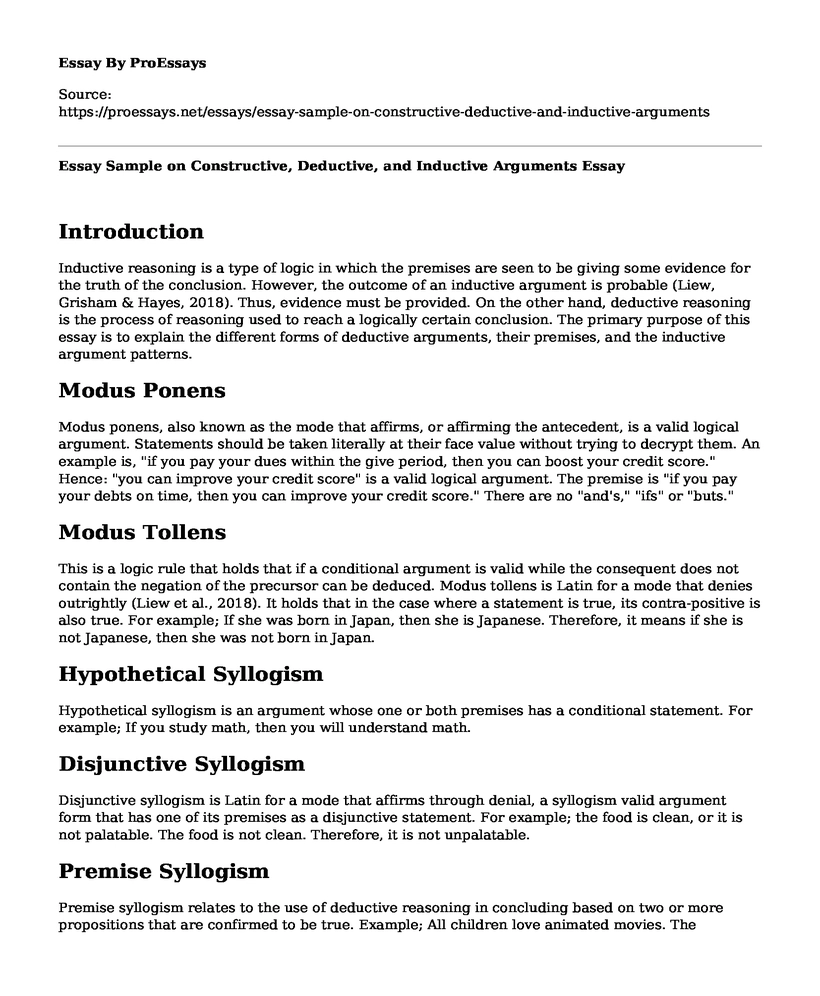Introduction
Inductive reasoning is a type of logic in which the premises are seen to be giving some evidence for the truth of the conclusion. However, the outcome of an inductive argument is probable (Liew, Grisham & Hayes, 2018). Thus, evidence must be provided. On the other hand, deductive reasoning is the process of reasoning used to reach a logically certain conclusion. The primary purpose of this essay is to explain the different forms of deductive arguments, their premises, and the inductive argument patterns.
Modus Ponens
Modus ponens, also known as the mode that affirms, or affirming the antecedent, is a valid logical argument. Statements should be taken literally at their face value without trying to decrypt them. An example is, "if you pay your dues within the give period, then you can boost your credit score." Hence: "you can improve your credit score" is a valid logical argument. The premise is "if you pay your debts on time, then you can improve your credit score." There are no "and's," "ifs" or "buts."
Modus Tollens
This is a logic rule that holds that if a conditional argument is valid while the consequent does not contain the negation of the precursor can be deduced. Modus tollens is Latin for a mode that denies outrightly (Liew et al., 2018). It holds that in the case where a statement is true, its contra-positive is also true. For example; If she was born in Japan, then she is Japanese. Therefore, it means if she is not Japanese, then she was not born in Japan.
Hypothetical Syllogism
Hypothetical syllogism is an argument whose one or both premises has a conditional statement. For example; If you study math, then you will understand math.
Disjunctive Syllogism
Disjunctive syllogism is Latin for a mode that affirms through denial, a syllogism valid argument form that has one of its premises as a disjunctive statement. For example; the food is clean, or it is not palatable. The food is not clean. Therefore, it is not unpalatable.
Premise Syllogism
Premise syllogism relates to the use of deductive reasoning in concluding based on two or more propositions that are confirmed to be true. Example; All children love animated movies. The conclusion at this moment will be; Therefore, pre-school children love animated movies.
Induction by Enumeration
Induction by enumeration refers to a free generalization that reasons from specific cases in point to all instances. Example; if one observes that 100 Mercedes Benz cars and all are automatic drives, one might deduce categorically that all Mercedes Benzes are automatic drives
Reasoning by Analogy
Reasoning by analogy argument adopts perceived similarities to deduce similarity that is yet to be observed. Analogical reasoning is the most popular method applied in decision making. For example; water is to thirst as food is to hunger.
Statistical Induction
Inductive statistics are commonly used in making hypothesis decisions that are premised on empirical results and is widely applied to probability theory (Hayes, Stephens, Ngo & Dunn, 2018). It is based on the fact that humans either think in deductive or inductive ways. Thus, a speaker derives a general conclusion from some specific instances. For example; He did not return my calls (premise), He did not respond to my texts (premise), He did not respond to my emails as well (premise), I think he is avoiding me (conclusion).
Higher-Level Induction
Higher-level induction logic admits higher attitude quantification and patterns as opposed to simple terms. For example; The cost of a fridge is USD100. Its manufacturing costs are USD100 while the sales price is USD300; so, the markup is reasonable.
Conclusion
The main difference between deductive reason and inductive reasoning is that while the former begins with a generalized theory, hypothesis or statement followed by an evidence-based conclusion, the latter starts with a question or observation supported by an approach that examines the related issues. The two types of reasoning are exact opposites.
References
Hayes, B. K., Stephens, R. G., Ngo, J., & Dunn, J. C. (2018). The dimensionality of reasoning: Inductive and deductive inference can be explained by a single process.
Liew, J., Grisham, J. R., & Hayes, B. K. (2018). Inductive and deductive reasoning in obsessive-compulsive disorder. Journal of behavior therapy and experimental psychiatry, 59, 79-86.
Cite this page
Essay Sample on Constructive, Deductive, and Inductive Arguments . (2022, Oct 21). Retrieved from https://proessays.net/essays/essay-sample-on-constructive-deductive-and-inductive-arguments
If you are the original author of this essay and no longer wish to have it published on the ProEssays website, please click below to request its removal:
- Essay Sample on Gun Violence in School
- Analysis of Different Learning Approaches Paper Example
- Importance of Play in the Early Childhood Classroom
- Performance Management at the University of Ghana Paper Example
- Essay Example on Instructing Kids: A Tool to Fight Plagiarism and Build Confidence
- Reflective Teaching: Critical Thinking for Improved Outcomes - Essay Sample
- Essay Example on Board of Education: Eradicating Infectious Diseases & Limiting Spread in Schools







